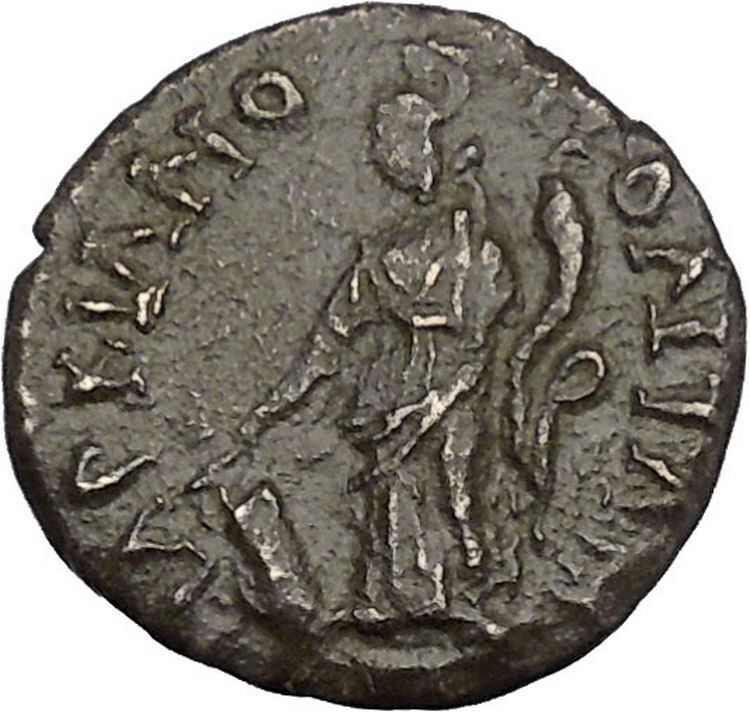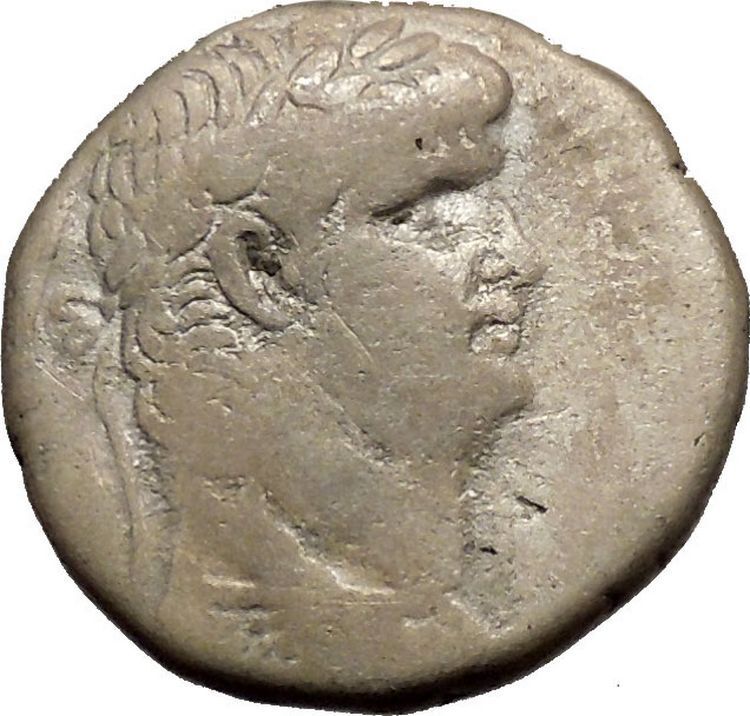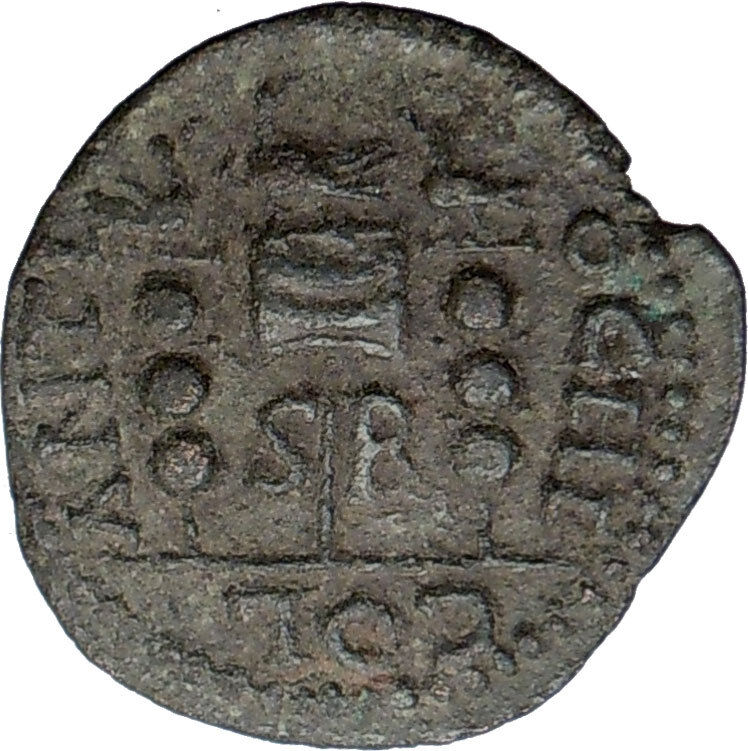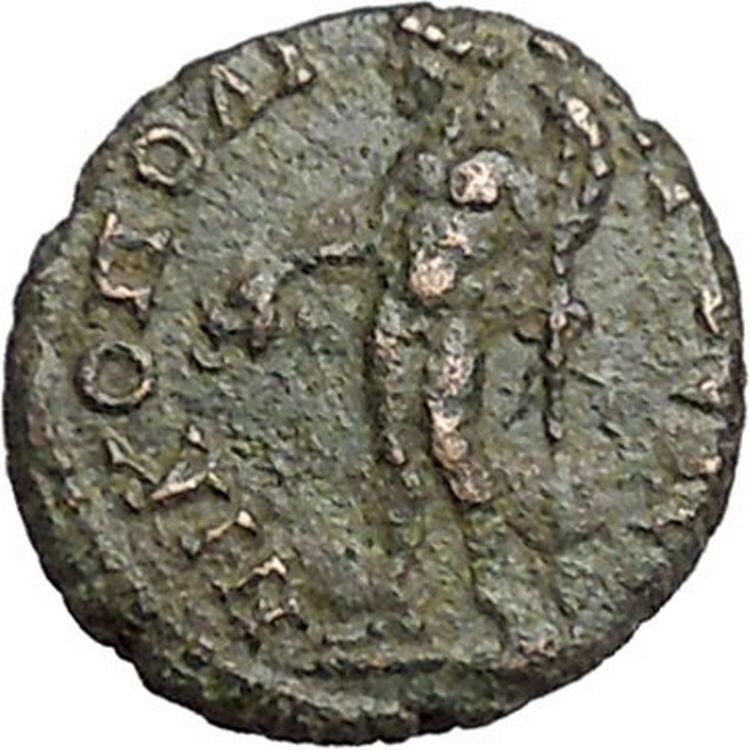|
Antoninus Pius – Roman Emperor: 138-161 A.D.
Bronze 19mm (9.34 grams) of Tyana in Cappadocia. Dated RY 19, struck 156/157 A.D.
Reference: RPC IV Online 5741; SNG Copenhagen 317; BMC 5-6
ΑΥΤΟΚ ΑΝΤѠΝЄΙΝΟϹ ϹЄΒΑ, laureate head to right.
ΤΥΑΝЄѠΝ Τ Π Τ ΙЄΡ ΑϹΥ ΑΥΤ, turreted figure of Tyche seated to left, holding grain ears and bunch of grapes, resting foot on river-god swimming below; ЄΤ-ΘΙ (date) across fields.
You are bidding on the exact item pictured, provided with a Certificate of Authenticity and Lifetime Guarantee of Authenticity.
 Tyche (meaning “luck”; Roman equivalent: Fortuna) was the presiding tutelary deity that governed the fortune and prosperity of a city, its destiny. She is the daughter of Aphrodite and Zeus or Hermes. Tyche (meaning “luck”; Roman equivalent: Fortuna) was the presiding tutelary deity that governed the fortune and prosperity of a city, its destiny. She is the daughter of Aphrodite and Zeus or Hermes.
In literature, she might be given various genealogies, as a daughter of Hermes and Aphrodite, or considered as one of the Oceanids, daughters of Oceanus and Tethys, or of Zeus. She was connected with Nemesis and Agathos Daimon (“good spirit”).
The Greek historian Polybius believed that when no cause can be discovered to events such as floods, droughts, frosts or even in politics, then the cause of these events may be fairly attributed to Tyche.
Worship
Increasingly during the Hellenistic period, cities venerated their own specific iconic version of Tyche, wearing a mural crown (a crown like the walls of the city).
Tyche had temples at Caesarea Maritima, Antioch, Alexandria and Constantinople. In Alexandria the Tychaeon, the temple of Tyche, was described by Libanius as one of the most magnificent of the entire Hellenistic world.
She was uniquely venerated at Itanos in Crete, as Tyche Protogeneia, linked with the Athenian Protogeneia (“firstborn”), daughter of Erechtheus, whose self-sacrifice saved the city.
Stylianos Spyridakis concisely expressed Tyche’s appeal in a Hellenistic world of arbitrary violence and unmeaning reverses: “In the turbulent years of the Epigoni of Alexander, an awareness of the instability of human affairs led people to believe that Tyche, the blind mistress of Fortune, governed mankind with an inconstancy which explained the vicissitudes of the time.”
Depictions
Tyche appears on many coins of the Hellenistic period in the three centuries before the Christian era, especially from cities in the Aegean. Unpredictable turns of fortune drive the complicated plotlines of Hellenistic romances, such as Leucippe and Clitophon or Daphnis and Chloe. She experienced a resurgence in another era of uneasy change, the final days of publicly sanctioned Paganism, between the late-fourth-century emperors Julian and Theodosius I who definitively closed the temples. The effectiveness of her capricious power even achieved respectability in philosophical circles during that generation, though among poets it was a commonplace to revile her for a fickle harlot.
In medieval art, she was depicted as carrying a cornucopia, an emblematic ship’s rudder, and the wheel of fortune, or she may stand on the wheel, presiding over the entire circle of fate.
The constellation of Virgo is sometimes identified as the heavenly figure of Tyche, as well as other goddesses such as Demeter and Astraea.
 Antoninus Pius – 138-161 A.D. Antoninus Pius – 138-161 A.D.
Caesar: 138 A.D. (under Hadrian)
Augustus: 138-161 A.D.
| Adopted son and successor of Hadrian | Husband of Faustina Senior | Father of Faustina Junior and Galerius Antoninus | Grandfather of Commodus, Annius Verus, Lucilla and Aurelius Antoninus | Adoptive father of Marcus Aurelius and Lucius Verus |
Titus Aurelius Fulvus Boionius Arrius Antoninus (19 September 86 – 7 March 161), generally known in English as Antoninus Pius was Roman emperor from 138 to 161. He was the fourth of the Five Good Emperors and a member of the Aurelii. He did not possess the sobriquet “Pius” until after his accession to the throne. Almost certainly, he earned the name “Pius” because he compelled the Senate to deify his adoptive father Hadrian; the Historia Augusta, however, suggests that he may have earned the name by saving senators sentenced to death by Hadrian in his later years.
He was the son and only child of Titus Aurelius Fulvus, consul in 89 whose family came from Nemausus (modern Nîmes) and was born near Lanuvium and his mother was Arria Fadilla. Antoninus’ father and paternal grandfather died when he was young and he was raised by Gnaeus Arrius Antoninus, his maternal grandfather, a man of integrity and culture and a friend of Pliny the Younger. His mother married to Publius Julius Lupus (a man of consular rank), Suffect Consul in 98, and bore him a daughter called Julia Fadilla.
As a private citizen between 110 and 115, he married Annia Galeria Faustina the Elder. They had a very happy marriage. She was the daughter of consul Marcus Annius Verus and Rupilia Faustina (a half-sister to Roman Empress Vibia Sabina). Faustina was a beautiful woman, renowned for her wisdom. She spent her whole life caring for the poor and assisting the most disadvantaged Romans.
Having filled with more than usual success the offices of quaestor and praetor, he obtained the consulship in 120; he was next appointed by the Emperor Hadrian as one of the four proconsuls to administer Italia, then greatly increased his reputation by his conduct as proconsul of Asia. He acquired much favor with the Emperor Hadrian, who adopted him as his son and successor on 25 February, 138, after the death of his first adopted son Lucius Aelius, on the condition that Antoninus would in turn adopt Marcus Annius Verus, the son of his wife’s brother, and Lucius, son of Aelius Verus, who afterwards became the emperors Marcus Aurelius and Lucius Verus (colleague of Marcus Aurelius).
Emperor
On his accession, Antoninus’ name became “Imperator Caesar Titus Aelius Hadrianus Antoninus Augustus Pontifex Maximus”. One of his first acts as Emperor was to persuade the Senate to grant divine honours to Hadrian, which they had at first refused; his efforts to persuade the Senate to grant these honours is the most likely reason given for his title of Pius (dutiful in affection; compare pietas). Two other reasons for this title are that he would support his aged father-in-law with his hand at Senate meetings, and that he had saved those men that Hadrian, during his period of ill-health, had condemned to death. He built temples, theaters, and mausoleums, promoted the arts and sciences, and bestowed honours and financial rewards upon the teachers of rhetoric and philosophy.
In marked contrast to his predecessors Trajan and Hadrian, Antoninus was not a military man. One modern scholar has written “It is almost certain not only that at no time in his life did he ever see, let alone command, a Roman army, but that, throughout the twenty-three years of his reign, he never went within five hundred miles of a legion”. His reign was the most peaceful in the entire history of the Principate; while there were several military disturbances throughout the Empire in his time, in Mauretania, Iudaea, and amongst the Brigantes in Britannia, none of them are considered serious. The unrest in Britannia is believed to have led to the construction of the Antonine Wall from the Firth of Forth to the Firth of Clyde, although it was soon abandoned. He was virtually unique among emperors in that he dealt with these crises without leaving Italy once during his reign, but instead dealt with provincial matters of war and peace through their governors or through imperial letters to the cities such as Ephesus (of which some were publicly displayed). This style of government was highly praised by his contemporaries and by later generations.
Of the public transactions of this period we have scant information, but, to judge by what we possess, those twenty-two years were not remarkably eventful in comparison to those before and after his; the surviving evidence is not complete enough to determine whether we should interpret, with older scholars, that he wisely curtailed the activities of the Roman Empire to a careful minimum, or perhaps that he was uninterested in events away from Rome and Italy and his inaction contributed to the pressing troubles that faced not only Marcus Aurelius but also the emperors of the third century. German historian Ernst Kornemann has had it in his Römische Geschichte [2 vols., ed. by H. Bengtson, Stuttgart 1954] that the reign of Antoninus comprised “a succession of grossly wasted opportunities,” given the upheavals that were to come. There is more to this argument, given that the Parthians in the East were themselves soon to make no small amount of mischief after Antoninus’ passing. Kornemann’s brief is that Antoninus might have waged preventive wars to head off these outsiders.
Scholars place Antoninus Pius as the leading candidate for fulfilling the role as a friend of Rabbi Judah the Prince. According to the Talmud (Avodah Zarah 10a-b), Rabbi Judah was very wealthy and greatly revered in Rome. He had a close friendship with “Antoninus”, possibly Antoninus Pius, who would consult Rabbi Judah on various worldly and spiritual matters.
After the longest reign since Augustus (surpassing Tiberius by a couple of months), Antoninus died of fever at Lorium in Etruria, about twelve miles (19 km) from Rome, on 7 March 161, giving the keynote to his life in the last word that he uttered when the tribune of the night-watch came to ask the password-“aequanimitas” (equanimity). His body was placed in Hadrian’s mausoleum, a column was dedicated to him on the Campus Martius, and the temple he had built in the Forum in 141 to his deified wife Faustina was rededicated to the deified Faustina and the deified Antoninus.
Historiography
The only account of his life handed down to us is that of the Augustan History, an unreliable and mostly fabricated work. Antoninus is unique among Roman emperors in that he has no other biographies. Historians have therefore turned to public records for what details we know.
In later scholarship
Antoninus in many ways was the ideal of the landed gentleman praised not only by ancient Romans, but also by later scholars of classical history, such as Edward Gibbon or the author of the article on Antoninus Pius in the ninth edition of the Encyclopedia Britannicaca:
A few months afterwards, on Hadrian’s death, he was enthusiastically welcomed to the throne by the Roman people, who, for once, were not disappointed in their anticipation of a happy reign. For Antoninus came to his new office with simple tastes, kindly disposition, extensive experience, a well-trained intelligence and the sincerest desire for the welfare of his subjects. Instead of plundering to support his prodigality, he emptied his private treasury to assist distressed provinces and cities, and everywhere exercised rigid economy (hence the nickname κυμινοπριστης “cummin-splitter”). Instead of exaggerating into treason whatever was susceptible of unfavorable interpretation, he spurned the very conspiracies that were formed against him into opportunities for demonstrating his clemency. Instead of stirring up persecution against the Christians, he extended to them the strong hand of his protection throughout the empire. Rather than give occasion to that oppression which he regarded as inseparable from an emperor’s progress through his dominions, he was content to spend all the years of his reign in Rome, or its neighborhood.
|




 Tyche (meaning “luck”; Roman equivalent: Fortuna) was the presiding tutelary deity that governed the fortune and prosperity of a city, its destiny. She is the daughter of Aphrodite and Zeus or Hermes.
Tyche (meaning “luck”; Roman equivalent: Fortuna) was the presiding tutelary deity that governed the fortune and prosperity of a city, its destiny. She is the daughter of Aphrodite and Zeus or Hermes. Antoninus Pius – 138-161 A.D.
Antoninus Pius – 138-161 A.D.




